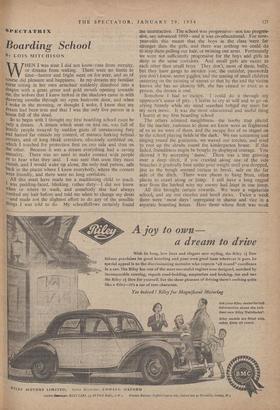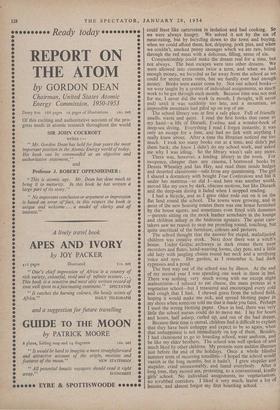By J. D. SCOTT ' HAVE no illusions," Mr. Somerset Maugham
has written, " about my literary position. There are but two important writers in my own country who have troubled to take me seriously, and when clever young men write essays about contemporaryfiction they never think of considering me." i r. Maugham's eightieth birthday, however, has ensured that, for this month at least, clever young men writing essays about contemporary fiction have written about no one else. The 9ecasion, and the selection of Mr. Maugham's novels* re- issued by his publishers to mark it, makes a return to these works irresistible. And when you return to them—and to 17. Maugham's snide remarks about them, and to Mr. maugham's fabulous success, and to the memories of a thou- sand issues of Nash's Magazine—the old questions begin, so gdiltlY, like sneezing powder, to insert themselves once again. ,lic had thought, perhaps, of a birthday party, of the making °f a few suitable remarks, of a murmur of " many happy returns "; but contact with that monumental worldly wisdom, that elegant yet searching irony, that felicitous power, recalls one to seriousness and to a sense of the metier. And the questions pose themselves again. „Ho good is he ? Is he a artist, or a clever fictioneer waosew successes are, accordingn to Mr. Robert Liddell, " no more than technical triumphs " ? Does he write well or is he, as Mr. Edmund Wilson has suggested, " not really a writer all " 2 One thing is clear. If Mr. Maugham really writes substitution of a period for a colon. These simple sentences are the vehicle for the quality which peculiarly distinguishes the best of Mr. Maugham's writing.
This quality is one of force, of swiftness, of the dramatic leap. We might call it the Maugham Effect. It is to be seen at its most ruthless in the opening of The Painted Veil, where Kitty and her lover are discovered by her husband, Walter. This is one of the most extraordinarily sudden and tense open- ings to a novel ever written; to read it is like realising that there are burglars in the house. The whole book has a kind of quiet, tense speed like ski-ing. It is made up of short sentences, short paragraphs, short chapters—eighty of them. In its concision it seems to me the most Maugham7like of Mr. Maugham's books, and in my opinion it is the best of his books.
Yet its limitations are very sharp. The short sentence, which is Mr. Maugham's instrument, is an instrument for stating things. For this purpose it is admirable. But it is not an instrument of suggestion, of implication. It does not echo; it has no reverberations. It can define; it cannot readily explore. So Kitty and Charlie Townsend and Walter are sharply delineated but not deeply comprehended. Nor, in his ripple of short sentences, does Mr. Maugham often permit himself the arresting image—presumably because it is arrest- ing, and would hold up that flow of narrative which Mr. Maugham values above all else. In The Painted Veil there are very few images, and most of them are so familiar that they do not engage the mind at all: " She was as white as the sheet. . . ."
" Her night was tortured with strange dreams." the public, but by critics and connoisseurs also : this lack befall mainly their inability to see that films, like all other works of art, must be made within the limitations of the form. Dealing with the Era of Sound he sees the same blindnesses all around him ; and his, discussion of what goes on today reiterates what is his personal basic argument : " The cinema has been created for the purpose of recording movement. This is a truth which nobody has ever attempted 10 dispute, and yet it is constantly being forgotten."
Today's generation of filmgoers includes a high percentage who have never seen a silent film : M. Clair, though maintaining a properly nostalgic feeling for that era in which he acquired masterYj has developed a complete sympathy with the means, aims and possible effectiveness of the sound film. It is his clear-eyed and sensitive appreciation of the worth of both kinds of film that enables him to talk so eloquently and yet with a nice humility about the problems of the director, the scenarist, the actor, the technician.
The smoothness of writing and the always comprehensive flow of argument are deceptive factors • as we approach the final pages our awareness of having been privileged to overhear this extensive duo- logue, in which so much has been so sensibly discussed, turns into a conviction that everything worth saying about the Cinema has been put before us with meticulous exactitude—and we realise that almost every page bears an utterance that must be re-read, and pondered on. Thirty years ago Rene Clair wrote : " The film is an incorruptible witness and records our past without imperceptibly retouching 0 as our memory does." This book may be unique among thlw making memoirs for its lack of imperceptible retouchings. A. V. COTO
An Approach to Hardy
Thomas Hardy : A Critical Biography. By Evelyn Hardy. (Hogartb Press. 25s.) THE biography of a writer who has died within living memory usually marked by an extreme caution ; there are often friends to consider, relatives to respect. This is not so with Miss Evelyn Hardy's new life of Thomas Hardy. She has boldly presented the man through his work ; she is reticent about nothing, and even discusses with candour the most painful part of Hardy's life—the tragedy of his first marriage. Miss Hardy has read both widely and deeply for this book. She has not only sought out the most remote sources of her subject, but has also, as far as possible, let Hardy speak for himself, by means of his note-books and letters and the invaluable Early Life and Later Years of Thomas Hardy by his second wife, the two biographies written with Hardy's help. But it is the finished work, the novels and poems, with which she is rightly concerned before all else. Though this approach to Hardy the man may perhaps be considered an oblique one, Miss Hardy nevertheless presents us with lively and enchanting pictures of him as a child and as a young man. We see him as a child,' barely breeched,' playing the fiddle for hours on end while the young men and women danced to his music. We learn of his extreme attachment to his mother (an attachment which is probably a clue to Hardy's acute understanding of women in 11!5 novels). Then, in London, we are shown him, as an architects draughtsman, reading John Stuart Mill and Swinburne and struggling with intellectual doubts about revealed religion. We learn of 1115 first experience of writing and of the encouragement and advice he received from John Morley. and Macmillan. After her account of Hardy's early life, Miss Hardy gives more and more space to careful assessments of his novels and poems' She notes that though, by the time he was writing his first novels, Hardy's reason had rejected Christianity, his imagination still dud to it. As an illustration of this, she cites his obsession with chore' and churchyard scenes in the early stories. These novels, fore' shadow the later ones in that, they too deal with the disillusionment of lovers ; but, as Miss Hardy notes, Hardy does not, in that give the almost exclusive attention to his female characters that he was to give increasingly in the later novels. As she progresses through the novels, Miss Hardy makes a fascinal:. ing survey of Hardy's great gift for imagery. This survey is one 01 the most valuable things in her analysis of the writer. A tYrq image of Hardy's, one which shows vividly the acuteness of his visual imagination, is this from The Trumpet Major : a girl's lemon' coloured boots are said to look " like a pair of yellow-hammers., flitting under her dress." This loving care for detail, this ski" in seeing likenesses, are undoubtedly twa very important attribute of a writer, They are proof of the power of his imagination, the imagination which, as Coleridge says, " while it blends and harmon; izes the natural and the artificial, still subordinates art to nature I the manner to the matter. . ."



















































 Previous page
Previous page